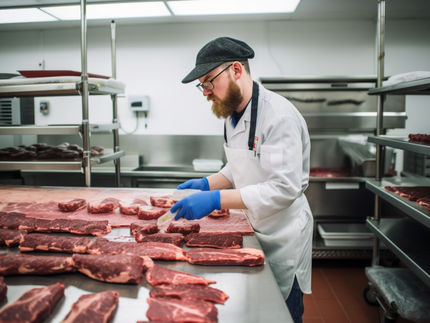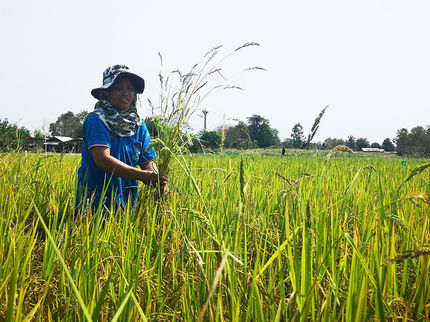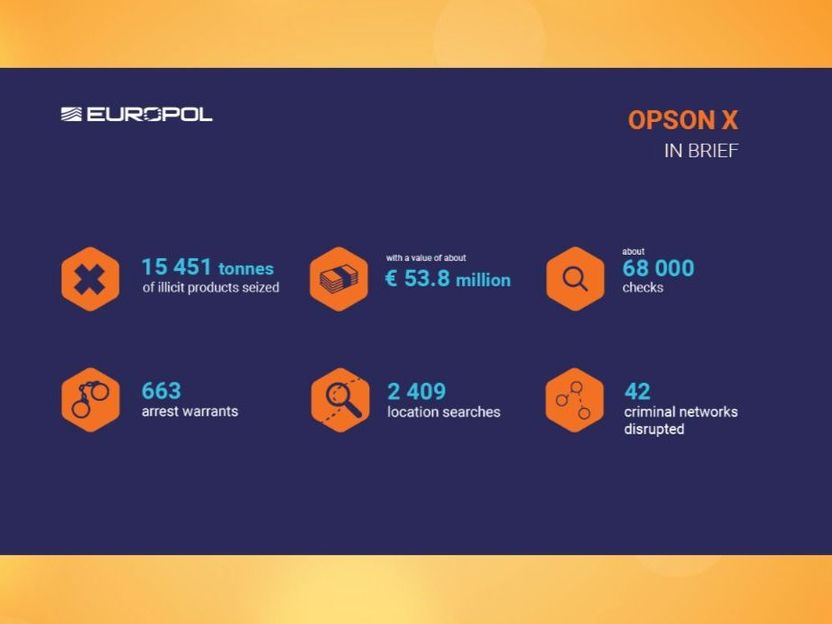"The market has matured" - key findings from the New Food Conference 2024
Advertisement
On September 3, 2024, a noticeably mature industry for alternative proteins met in Berlin to share insights and network even more internationally. The New Food Conference brought together industry representatives from all over Europe, from Denmark to Italy, and even from Brazil, Chile and Mexico. Among the participants was Renate Künast, Member of the German Bundestag and Federal Minister of Food from 2001 to 2005. The discussions focused on convincing narratives.
Stable markets in DACH
Edwin Bark, Senior Vice President at Redefine Meat, described the development of the European market for plant-based meat in recent years as an S-curve: enormous growth during the Covid pandemic was followed by stagnation with declines in several countries. The situation in Germany is different: "The DACH markets have developed surprisingly positively and have continued to grow in most markets," says Bark.
Growth through volume - and discounters
ProVeg market expert Elsa Guadarrama explained that consumers in Germany, Italy and France are reducing their animal-based consumption the most across Europe. The German market for plant-based products is considered the largest in Europe.1 Based on retail data from GfK2, the conference participants learned that the value of plant-based categories in Germany has increased due to higher sales volumes, while the value of animal-based products has increased due to higher prices. "Plant-based products have expanded their presence in Germany, especially through discounters," reported Guadarrama.
Innovations: targeted and realistic
For emerging technologies, the market development also meant a decline in investment. Christian Pichler, Managing Director and founder of Gerber-Rauth, explained that the industry had learned from this to "focus on the essentials and use resources". Fabio Ziemssen, Partner at Zintinus, also stated: "The market has matured and the environment in the sector has become healthier." Dana Wilson, Senior Analyst at FAIRR Initiative, observed a segmentation: "Of the 20 companies we monitor, 95 percent continue to invest and expand their portfolio of alternative protein sources." What's more: "While private investment has declined in recent years, two-thirds of government funding commitments have been made as of 2022." At the ProVeg Incubator's Demo Day, the start-ups Optimized Foods with mycelium-based fat encapsulation and AIprotein with protein ingredients from microalgae and duckweed impressed the expert jury and audience.
No alternatives - a new category
Investors are trying to find earlier routes to market for their portfolio companies, says Nicolaus Norden, Venture Capitalist at FoodLabs. They have high hopes for precision fermentation - as a key technology for the cheese segment or to stabilize supply chains, for example for eggs. The investors are also pinning their hopes on molecular agriculture. "We have tasted wonderful products today," concluded Fabio Ziemssen from Zintinus, now it's all about the right narrative: "The narrative must go hand in hand with a lifestyle approach: This is not an alternative, but a completely new category that will prevail."
Tech talk: the audience sets the tone
Young consumers are talking confidently about technology, reported Eva Sommer, CEO and founder of Fermify. Many chefs are also open to tech talk, according to Randi Wahlsten, CEO and co-founder of MATR Foods: "When we talk to chefs about fermentation, they are very enthusiastic and see all the benefits." Not so most consumers, she pointed out. Edwin Bark emphasized with regard to food service and retail and consumers: "We are not selling technology. We are selling the most delicious plant-based meat."
Food service first
Randi Wahlsten from MATR Foods explained the central importance of the food service sector for establishing products: "If we are supported by chefs or upscale restaurant chains that people trust for good quality, it also helps with retailers." In addition, professional preparation in the out-of-home market is proof for consumers of the quality, versatility and good taste of the products, the manufacturers explained. Here, animal ingredients can easily be replaced by plant-based ingredients. This is interesting for international caterers and their customers, all of whom have sustainability goals.
Where sustainability counts
Sustainability was also the topic of the participation round for food retailers for the upcoming "Superlist Environment Germany" analysis. "Retailers understand the benefits of benchmarks for their sustainability efforts. The retailers with the most effective strategies and measures can set themselves apart from the competition as pioneers. One important benchmark is measuring the protein ratio," says ProVeg market expert Dirk Liebenberg. Lidl in Germany has been measuring its protein ratio in sales volume since last year and has set itself targets.3 Yesterday, Aldi Süd announced that it will also measure the ratio of animal and plant-based products in future.4 Dairies also want to do more than just reduce their CO2 emissions, reported Eva Sommer from Fermify: "In countries such as the Netherlands, Denmark and Ireland, the number of cows has been limited, mainly due to high nitrate levels. So we are helping dairies to shift their growth to precision fermentation."
The path to speed and volume
To save time, Planted relies on its own capacities for research and development, prototyping and testing. Nosh.bio deliberately chose B2B distribution: "Every euro we would have to spend on building a consumer brand, scaling distribution channels and building a good reputation could not be invested in further developing the technology," says CEO and co-founder Tim Fronzek. Like Tönnies, Nosh.bio relies on existing machines and facilities, such as former breweries. Limited shelf life products and weather-related fluctuations in demand require more than just a good hygiene concept, Dr. Gereon Schulze Althoff, Chief Sustainability Officer at Tönnies, pointed out: "We have to be very flexible in order to ramp up and ramp down production from day to day." Lidl in Germany has increased its sales volume with price adjustments, placement alongside animal products and campaigns and serves as a showcase both internally and externally, explained Alexander Liedke, Director CSR Sourcing: "With this mix of measures, we were able to achieve an impressive increase of 30 percent in six months."
Open arms for agriculture
The desire for close and trusting dialog with the agricultural sector spanned the conference. Rune-Christoffer Dragsdahl, Secretary General of the Vegetarian Society of Denmark, reported that he likes to start with the message: "I come in peace." Lea Fliess, Managing Director of the Forum Modern Agriculture, knew that the President of the German Farmers' Association grows chickpeas himself, but emphasized: "We need cultivation contracts." Pulses offer an answer to drought and heat, for example in Brandenburg, but the financial risk for farmers is high. With regard to his country's Green Deal, Jack Vera from the Dutch embassy in Germany spoke out in favor of approaches that encompass the entire value chain: "Value chains are often international, at least if you want to expand production." Financing can only be secured on the basis of science, emphasized Fliess. She later thanked them "for their genuine interest in the farmers' perspective!"5
Changing diets without friction
Several speakers pointed out that consumers already perceive their lives as complex enough: "We know from research that people are willing to switch to a more sustainable food system, but they don't want to think about it when they shop or cook," explained Martine van Haperen, nutrition expert at ProVeg Netherlands. For Stephan van Sint Fiet, CEO of Vivici, this meant the following for consumer communication: "The best way to sell sustainability is by not talking about sustainability." Diego Pacheco, Sales Director Europe at Novameat, explained what matters instead: "If we can offer a product that people can prepare as they once did with animal meat, without friction, then we add value to the category."
Processed and healthy
According to Niklas Oppenrieder, founder of the health association PAN International, the equation of ultra-processed foods with poor health in nutritional science has been crumbling for years: "We are seeing more and more research and working groups in important nutrition and medical associations questioning this view and calling for more nuance." Instead, consumers should rely on readily available information, says Chris Bryant, Director of Bryant Research: "All foods are labeled for calories, saturated fat, salt and fiber. These are the four points where plant-based meat generally scores better than animal-based meat."
Taste is the trump card
Because: "People eat food," is the simple formula of Armando Perez-Cueto, Professor of Nutrition at Umeå University. His appeal for consumer communication is to move away from abstract communication, whether about sustainability, animal welfare or nutritional values, towards the tangible - to "taste and texture and the good feelings afterwards."
Sources
1 GFI (2023): Alternative proteins in Germany - Report on current developments in sustainable protein sources based on plants, cell cultivation and fermentation, as at: May 2023. Online at: https://gfieurope.org/wp-content/uploads/2023/05/GFI-Europe-Alternative-Proteine-in-Deutschland-Full-Report.pdf
2 MAT June 2023 to MAT June 2024.
3 Lidl: Protein strategy, accessed on 10.09.2024. Online at: https://unternehmen.lidl.de/verantwortung/gut-fuer-die-menschen/gesundheit-foerdern/handlungsfelder/bewusste-ernaehrung/proteinstrategie
4 Aldi Süd (2024): Aldi Süd Ernährungsreport: Discounter carries more plant-based than animal-based products in its range, published on 09.09.2024. Online at: https://www.aldi-sued.de/de/newsroom/alle-pressemitteilungen/nachhaltigkeit/2024/aldi-sued-ernaehrungsreport-discounter-fuehrt-mehr-pflanzenbasierte-als-tierbasierte-produkte-im-sortiment.html
5 Online unter: https://www.linkedin.com/posts/jens-tuider-696856182_newfoodconference-proveg-proveg-activity-7236793421674229762-d3yy
Note: This article has been translated using a computer system without human intervention. LUMITOS offers these automatic translations to present a wider range of current news. Since this article has been translated with automatic translation, it is possible that it contains errors in vocabulary, syntax or grammar. The original article in German can be found here.

































































